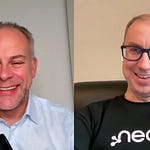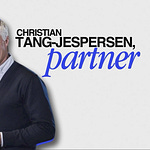Welcome back to the EUCVC Summit Talks, where we bring you candid conversations with Europe’s leading founders, corporate leaders, and investors shaping the future of venture collaboration.
In this episode, Jeppe Høier sits down with Simon Boas Hoffmeyer, Global Head of Sustainability & ESG at Carlsberg, and Kasper Hulthin, serial entrepreneur and investor at Future Five (co-founder of Kost, Peakon, and more).
With ESG facing political backlash, accusations of greenwashing, and shifting investor sentiment, the question looms: is ESG still a lever for real change—or does it need a reset? Simon and Kasper explore what’s broken, what still works, and how corporates and startups can embed sustainability into real business value.
🎧 Here’s what’s covered
00:10 ESG under fire — political pushback, greenwashing, and regulatory flip-flops.
01:00 Carlsberg’s take: facts, faith, and fear as the drivers of sustainability.
02:00 Why startups must reframe ESG as financial return, not a premium add-on.
03:00 Culture vs. compliance — how corporates integrate ESG into decision-making.
05:00 Born-green startups vs. legacy corporates: different pressures, same imperatives.
06:00 Where opportunities lie: inputs for future food systems, alternative coffee and chocolate.
07:00 From “sustainability” funds to “energy transition” — reframing the narrative.
08:00 Partnerships in practice: pilots, off-take agreements, and startup collaborations.
09:00 The investment paradox — more money into NFTs than climate at ESG’s peak.
You can listen to the full conversation from the EUCVC Summit 2025 on Apple Podcasts and Spotify.
✍️ Show Notes
The ESG Backlash
Triple hit: failed hype startups, political polarization, and EU legislative flip-flops.
Yet practitioners inside corporates see resilience and ongoing progress.
Startups’ Challenge
Consumers won’t pay a premium for sustainability anymore.
ESG must translate into financial return and product advantage.
Carlsberg’s Approach
Works on three lenses: facts (pricing power), faith (customer preference), and fear (regulation/taxation).
Sustainability secures the “license to operate” in a world where beer and soda face scrutiny.
Opportunities in ESG
Alternative inputs (coffee, chocolate) highlight climate-driven price pressure.
Startups offering better, cheaper, and sustainable solutions show where ESG aligns with economics.
The Reframing
ESG branding losing traction; “energy transition” and other narratives gain ground.
What matters: real products solving resource and climate bottlenecks.
Partnerships & Capital
Corporates like Carlsberg engage broadly with startups on measurement, biodiversity, and resource efficiency.
Venture capital often follows hype cycles (crypto > climate). Long-term impact needs corporate commitment to pilot and adopt solutions.
💡 One-liner takeaway: ESG isn’t dead—it’s evolving. The winners will be startups proving real economic value and corporates embedding sustainability into their license to operate.









